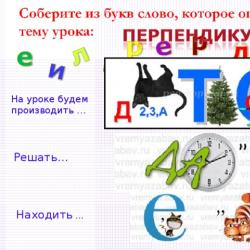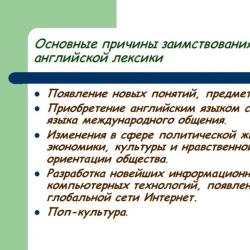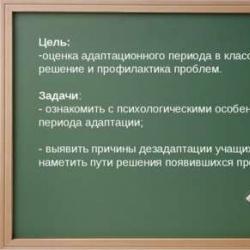Primary school subjects. Educational subjects in Russia. educational institutions of the Russian Federation
Preparing for the new school year is a complex process. Many little things require the attention of parents of future fifth graders - this is the purchase of office supplies, the purchase of workbooks, and the choice of a suitable backpack or bag. But the most important thing you need to know is the list of subjects that will be taught in grade 5 in the 2017-2018 academic year.
Required items:
- Mathematics - 5 hours a week are allotted for its study;
- Russian language - 5 hours a week;
- Literature - 3 hours a week;
- Foreign language– most often English, 3 hours a week;
- Physical education - 3 hours a week;
- History - 2 hours per week;
- Geography - 1 hour per week;
- Music - 1 hour per week;
- Visual arts - 1 hour per week;
- OBZh - the basics of life safety, 1 hour per week;
- Technology - in the fifth grade it comes to replace labor, since 2017, within the framework of technology, it is supposed to study robotics, 1 hour per week.
This is a very important innovation, since already from the fifth grade, schoolchildren will be able to master modern technologies, including 3D modeling, for which 3D printers will be supplied to schools.
As you can see, there are only 11 general subjects studied on a mandatory basis. However, in fact, the schedule of a fifth-grader is much wider. And here's why: in addition to the compulsory disciplines prescribed by the basic curriculum, there are a number of optional and optional subjects studied as prescribed by the school or at the discretion of the parents.
Optional subjects, their complete list and teaching methods are determined by the school administration independently:
- Natural science - depending on the accepted educational module, it can be included in the number of compulsory subjects,
- Biology - the subject is studied either as part of the OBZh or is introduced as an independent one, from 1 to 2 hours a week;
- Informatics - at the discretion of the school administration, the study of ICT can begin both in the 5th grade and in the 7th, 1-2 hours a week
- Civics - not studied everywhere, as a rule, 1 hour per week;
- Social studies - it is included in the number of compulsory subjects starting from the 6th grade, in the 5th grade it is studied as an optional subject;
- The second foreign language - most often German or French, is studied in tandem with English; conducted in parallel with the main foreign language or at the discretion of the parents as an elective 1-3 hours a week;
- Natural science is a natural science discipline, 1 hour per week is allotted for its study; often replaced by natural history or biology;
- Fundamentals of Religious Cultures and Secular Ethics - can be studied as an optional course, 1 hour per week;
- ODNKNR - teaching the basics of culture and traditions of the peoples of Russia can be conducted within several subjects or as an independent discipline;
- Local history - this subject can be included both in the educational module on history, and taught as an independent discipline.
In addition to these disciplines, the school can teach as optional disciplines and other subjects, as well as interest clubs and sports sections. Most often it is:
- guitar;
- chess;
- tennis;
- volleyball;
- martial arts;
- football;
- foundations of Orthodox culture;
- rhythm;
- rhetoric.
Grade 5: What are we learning?
Changes made to the educational process can confuse not only unprepared parents, but even teachers. Therefore, before starting school year and at the beginning of each new term, the question “what do we study in the fifth grade” is more relevant than ever.The disciplines that will be taught in the fifth grade in the 2017-2018 academic year are determined by the order of the Ministry of Education and Science, which is called "On the approval and implementation of the federal state educational standard for basic general education." It was last updated on December 31, 2015. The list of subjects studied in grade 5 is formed as follows: each school draws up its own curriculum for the coming academic year. The plan is drawn up on the basis of the above order, as well as the Federal Law "On Education", federal education standards, basic plans provided by the profiling department, and a number of other regulatory documents. At the same time, the school has the right to make changes to the curriculum - the main thing is to withstand the prescribed number of hours of compulsory disciplines.
Watch a video about preparing for grade 5:
The new law on education was adopted at the end of last year and entered into force on September 1, 2013. The law made some changes to the education system and consolidated several innovations. Including, according to the new law on education, the compulsory subjects at school have changed.
The changes affected preschool, secondary (complete), primary vocational, higher and family education. Today, parents in kindergartens pay 20 percent of the total amount of maintenance of children in a preschool institution. Under the new law, educational services will be provided free of charge, and additional ones will be paid. The list of paid services includes babysitting and care, food, communication costs, property, and so on.
The most serious concern among parents is the provision on new state standards on education. These standards are expected for each educational level. The new federal standards of education in elementary grades are already in effect, and from 2013 they will be launched in the middle level. As for the Unified State Examination, what will be new is that there will be another compulsory subject - a foreign language. It will be required for all high school students from 2014.
It is very important that legislators turned their attention to the non-state sector in education. Now state and non-state institutions have become equal in rights, which allows us to hope for the development of private initiative in education. The law also allows home education.
In accordance with the new law on education, the concept of education in the upper grades is specialized education. Two-thirds of the plan will be required subjects. Their students must choose from eight subject areas (mathematics and computer science, philology and a foreign language, social sciences, natural sciences, art, life and physical culture, technology). From each subject area, the student must choose at least one academic discipline. There should be 9-10 such items in total. Rest academic disciplines The student will choose based on the profile of training.
According to educational experts, thanks to new system, the burden on children should be reduced. Now schoolchildren will have the opportunity to study those subjects that they don’t particularly need, only at a basic level. Some of the parents, in turn, are sure that the level of preparation of schoolchildren will also decrease. Especially catastrophic can be considered the situation when a high school student is engaged in in-depth study physics and mathematics, and in the end decides to enter the Faculty of Humanities. In this case basic knowledge humanitarian subjects will not give them the opportunity to enter a university, and parents will be forced to hire tutors.
The Communists, led by the leader of the Communist Party of the Russian Federation Gennady Zyuganov, submitted for consideration a draft amendment to the main law "On Education", according to which the law should include a single curriculum for all subjects Russian Federation, containing a list of compulsory subjects, courses and disciplines, as well as their maximum volume. The Communists propose sixteen subjects as mandatory. Compulsory subjects in school under the new law on education, the communists believe, should be Russian, literature, mathematics, computer science, a foreign language, social studies, history, geography, physics, the basics of natural science, biology, chemistry, technology, art, life safety and physical education. The authors are confident that the innovation will solve the problem of "inconsistency in curricula".
Since September 1, 2013, the conditions for admission to the university have also changed. Now only winners of all-Russian school Olympiads, members of Russian national teams participating in international Olympiads in general education subjects, champions or prize-winners of the Olympic and Paralympic Games will be able to enter the university without exams. Disabled people are enrolled in the university out of competition, having passed the entrance examinations. The remaining categories of beneficiaries have the right to take advantage of two support measures: training courses in an educational institution and gain an advantage in enrollment with an equal number of points.
Parents are very worried about the question: will schooling become paid, because the new law allows the development of paid services at school. It is necessary to understand that the state provides a guarantee of affordable and high-quality free education within the framework of state standard. The standard gives the student extensive knowledge that allows him to enter higher education. educational institution. At the same time, the new law on education also provides for an increase in paid educational services at school. For knowledge that goes beyond educational standards, parents will have to pay. Whether certain knowledge is included in the educational standard is easy enough to check. As for the cost of the service, it is determined by the school, and an economically justified calculation of this cost, together with a draft contract for the service, is posted on the website of the institution.
Today, a wide variety of academic disciplines are taught in public schools - biology, physics, chemistry, algebra, literature, foreign languages, and so on. - which should contribute to the formation of a harmonious and educated personality. But some scientists are sure that the list of compulsory school subjects should be completely different.
1. Fundamentals of writing fantasy novels

If you ask any student elementary school, then he will say: writing your own stories is fun. Many scientists argue that for the best development of imaginative thinking, children should not only learn classical literature, but also learn to write books themselves.
2. Applied mechanics (invention)

In schools, as a rule, they teach abstract algebra and geometry, which is of little use to anyone in life. Most children find these subjects boring because the curriculum only provides bare theory. For sure more people would begin to get involved in the exact sciences if they taught them by practical examples, while inventing various devices. Maybe there would be a new Leonardo da Vinci in the world.
3. Filmmaking

Some public schools have theater clubs that are optional, not compulsory. But in such circles they usually teach performing skills. Given the pace at which the film industry is developing in the world, it would be worth teaching children how to make films or TV shows. For example, one has only to imagine how much more brilliant films Steven Spielberg would have made if he had received the appropriate education at school.
4. Latin

AT modern world It is very important to know not only your native language. Latin is the basis of any language Romanesque group. If you get at least a basic knowledge of Latin at school, then it will be much easier to learn Spanish, Italian, Portuguese and French.
5. Multidenominational theology

After graduating from a public school or college, most young people have no idea about the intricacies of interpretation of most of the world's major religions. In order not to prejudice the beliefs of other nationalities, it would be worthwhile to familiarize yourself with the pros and cons of each of them.
6. History of philosophy

Of course, it is worth being realistic and not relying on the fact that children will be able to fully comprehend all the complexity and abstraction of philosophical science. But the basics of philosophy could be useful in Everyday life: people would stop thinking too one-sidedly. All famous politicians were often guided in their work and decision-making by the works of such geniuses as Socrates, Plato, Aristotle, Confucius, Gautam, Sun Tzu and many others.
7. Sports

All schools have physical education classes designed to keep children in general physical shape. It would be much more practical if children, in addition to running and jumping, also learned the basics and rules of popular sports such as football or basketball.
8. Chess
Most people have a very vague idea of how different pieces move in chess. There are only 1000 International Grandmasters worldwide. At the same time, absolutely all scientists admit that chess is an excellent tool for the development of the mind. Professional chess players almost always show better results in the exact sciences, and are also much more diligent and have more analytical thinking.
9. Music

There are music lessons in almost any school, but the knowledge that children receive is very fragmentary. For example, only a paragraph in a textbook can be devoted to Beethoven, and most high school students do not know anything at all about Rachmaninoff. Classical music would obviously not be superfluous in the school curriculum.
10. Martial arts

It would not be superfluous to include the basics of teaching martial arts in physical education lessons so that children can protect themselves from bullies. Also, children could gain more self-confidence, which would help them in later life.
As soon as a person becomes an adult, he understands that at school he was taught not at all what can be used in real life. In our previous review.
School is a place where a person receives a knowledge base that will help him find his occupation in life and vocation. The list of subjects at school is very diverse, and this helps the student to determine the direction in the exact or
The first thing with which learning begins is the Russian language, reading and mathematics. The main task in the first months is to accustom the child to perseverance and patience, diligence and accuracy, the desire to learn something new.
In addition to the main subjects, they also include disciplines such as drawing, technology, the world around them, singing and physical education, so that the child expands his horizons and can thus find his hobby.
From grades 4-5, a foreign language, religious culture and secular ethics are added, which expands the boundaries, opens up new directions.
Russian language and mathematics lessons
Russian language and mathematics are the main subjects that start from the first and end in the 11th grade. These two subjects are considered the basis of all the basics, because without them it is difficult to write or calculate anything, and in life it will be difficult to do without studying these subjects. A person can only speak, but his speech will be illiterate.

Unlike the Russian language, which is studied all school years, mathematics is divided into 2 areas in the 7th grade: algebra and geometry.
In elementary school, a student learns basic skills: addition, subtraction, multiplication and division, actions with fractional numbers, and only then algebra appears with the study of a coordinate system and a system of equations, as well as geometry, where they study vectors, stereometry, planimetry.
Biology, geography, history and computer science lessons
The list of subjects at school does not end with the main subjects. Such sciences as biology, chemistry, physics, history and social studies or geography lessons can become very interesting and exciting, where you can learn about the entire planet: in the classroom, children study the types of soils, minerals, climate and population of the globe, continents, countries and much more.
Thanks to such subjects, the student understands more and more what he would like to do after receiving his basic education, where he would like to go to study after school. Russian language and math bring out the humanities and fine minds, and additional required subjects help find direction.

For example, if a child fell in love with "The World Around The World", then biology and chemistry, then perhaps he wants to become a doctor or go to study as a pharmacist in order to create new drugs.
What subjects are missing at school?
All the subjects that are taught in schools today, from Russian language and literature to geometry lessons and a second foreign language, should form an educated person who will find his way in life. But some scientists argue that there should be an additional list of subjects in school that are sure to come in handy in life:
- Applied Mechanics - Many children find subjects like algebra and geometry to be very boring. But if all the rules and new topics were put into practice, surely more people would be carried away by the exact sciences.
- Latin is the basis of the Romanesque group. Thanks to the knowledge of Latin, you can easily learn not only English, but also French, Italian, Spanish and Portuguese.
- The history of philosophy is a complex discipline that can not be understood even after school. However, such a subject will teach you to think in a more detailed, systematic way and help you get some ideas that may be useful in life.
In addition to these subjects, you can also add the study of martial arts, film production, familiarity with the directions of religion, music.






